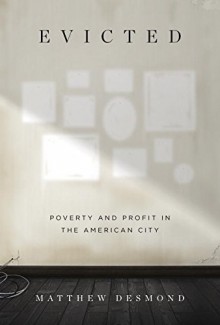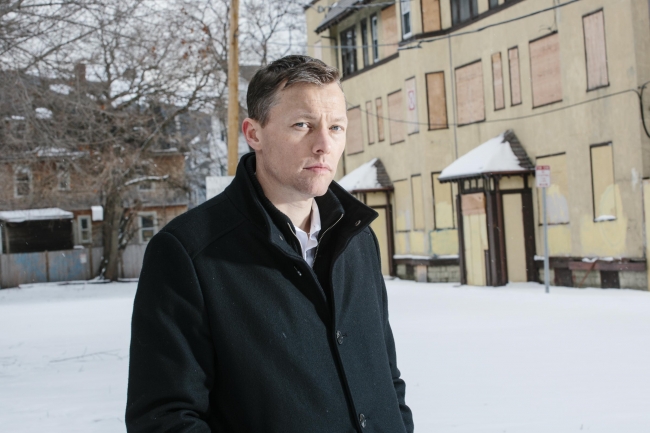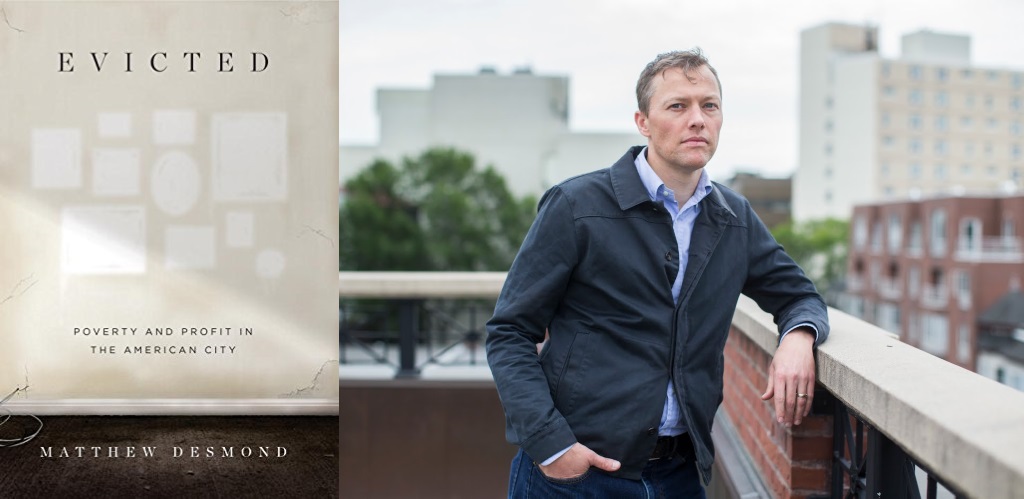
Poverty and Profit in the American City
By: Matthew Desmond
ISBN: 9780553447439
Publisher: Crown Publishing
Publication Date: 3/1/2016
Format: Hardcover
My Rating: 5 Stars
A special thank you to Crown and NetGalley for an ARC in exchange for an honest review.
Matthew Desmond, an urban driven ethnographer explores poverty in American through keen insights and new eyes in his latest EVICTED: Poverty and Profit in the American City—a gripping story of eight families on the brink of being homeless, the landlords, our housing crisis, and the fallout. Justice for the poor. A "Must Read" for every American (young or old).
The trauma of EVICTION.
One of the most urgent and pressing issues facing America today. How do we look at poverty? Every year in this country, families are being evicted by the millions. Unless you have suffered or lived through these tough times, you may not be aware of the severe consequences. It may be one of the least studied processes affecting the lives of the poor families. It is now commonplace. Poor families move because they are forced to.
Through his field study and research, Desmond saw firsthand, many landlords found it cheaper to contend with evictions than to keep up their properties. He began piecing together the workings of this market, he needed answers to fundamental questions. How common was eviction? Whom did it affect? The long-term consequences? He was perplexed to find no readily available data. So he began to gather it himself.
Between 2009 and 2011, he found, more than one in eight Milwaukee renters endured a forced move. Eviction was a blemish that led many landlords to refuse to rent to families. It excluded them from certain housing aid. It drove them into dangerous homes. It compromised their job performance, and affected their mental health.
Families lose not only their home, school, and neighborhood, they lose their clothes, possessions, furniture, government aid, and loss of jobs. Plus, time to rebuild, and save to establish a new residence. They also lose the benefit of public housing, due to unpaid debt and previous evictions. From the toll it takes, both mentally and physically--the trauma evictions and foreclosure can bring.
“Eviction is a cause, not just a condition of poverty."
Desmond’s book is set in Milwaukee, follows eight families; black and white, with and without children. From trailer parks and the ghettos. Eviction’s fallout is severe. Losing a home sends families to shelters, abandoned houses, and the street. In addition, the psychological repercussions: depression, illness, forcing families to move into degrading housing in dangerous neighborhoods, uprooting communities and harming children. Eviction reveals people’s vulnerability and desperation, as well as their ingenuity and guts.
Broken down into Three Parts:
Part One: Rent, Part Two: Out, Part Three: After. Each chapter is broken out in the prologue with detailed notes and reference for further reading and research. The combined data sources provided a new portrait of the powerful ways the private housing sector could be shaping the lives of poor American families and their communities. All of this suffering is shameful and unnecessary.
Desmond believes in building rapport with the people you want to get to know better and follow them over a period of time observing and experiencing what they do, alongside them and recording their actions and interactions as you move with them.
Understanding people, and allowing their lives to mold your own as fully and genuinely as possibly. How they think and feel. By renting a trailer allowed him to meet the people, hear what they had to say, and experience tenant’s concerns as well as landlords—perspectives. People on the verge of homelessness.
From eviction court, shelters, abandoned homes, counseling sessions, and listening to their fears and desperation. Firsthand observation. Their journey. As they say, you cannot really know someone's hardships until you walk in their shoes.Most low income families are living in apartments they cannot afford; those being the bottom of the market.
“Our cities have become unaffordable to our poorest families, and this problem is leaving a deep and jagged scar on the next generation.”
Eviction affects the old and the young, sick and able-bodied. If these people are spending this much on housing, what are they going without? From healthcare, utilities, food, clothes, and transportation. Our society has looked at the economics of jobs, public assistance, parenting, and mass incarceration.However, we have failed to appreciate how deeply housing is implicated in the creation of poverty.
Desmond demonstrates in his insightful book not everyone living in a distressed neighborhood is associated with gang members, parole officers, employers, social workers, or pastors. But nearly all of them have a landlord.
In 2008, as a graduate student at the University of Wisconsin at Madison, Desmond moved into a Milwaukee trailer park. He wanted to be in the trenches in order to immerse himself in the midst of landlords and tenants. From struggles, lack of housing, to the high percentage of total income in order to locate affordable housing. Heartbreaking stories.
 Matthew Desmond, an associate professor of sociology and social science at Harvard and co-director of the Justice and Poverty Project addresses these questions, by raising awareness—we have a housing problem. What is the solution? What it really means to be evicted. Housing. Poverty. The urban poor. A rising problem in America.
Matthew Desmond, an associate professor of sociology and social science at Harvard and co-director of the Justice and Poverty Project addresses these questions, by raising awareness—we have a housing problem. What is the solution? What it really means to be evicted. Housing. Poverty. The urban poor. A rising problem in America.
For every eviction executed through the judicial system, there are two others executed beyond the purview of the court, beyond any form of due process. Informal evictions. His data showed the median age of a tenant in the Milwaukee’s eviction court was thirty-three. Youngest nineteen; oldest sixty-nine. The median monthly household income of tenants in eviction court was $935 and back rent owed equaled this amount. With children, this could be equivalent to four months of back rent.
To Desmond, poverty was a relationship, one that brought together the rich and the poor. The way to understand it was to find some process that exposed those ties. Fewer and fewer families can afford a roof over their head. How do the poor survive? Food, clothing, and stable housing. Even in the most desolate areas of American cities, eviction used to be rare. These days there are sheriff squads whose full-time job is to carry out eviction and foreclosure orders. From moving companies, data mining companies, housing courts; low-income families have grown accustomed to their belongings lining the curbs.
Millions of Americans are evicted every year because they can’t make the rent. Unfortunately, the majority of poor renting families in America spend over half of their income on housing, and at least one in four dedicates over 70 percent to paying the rent and keeping the lights on.
There is hope. There are solutions. Federally Funded Housing Choice Voucher Program helps secure decent housing. (we need more of them). They reduce homelessness and allow families to devote more resources to heath care, transportation, and food. However, there are waiting lists. Some are so long, they are now closed, with no availability in sight. This means the people are not moving until they die. They have secured their slot.

As Desmond reiterates, a problem as big as the affordable housing crisis calls for a big solution. It should be the top of American’s domestic policy agenda because it is driving poor families to financial ruin and even starting to engulf families with moderate incomes. Today over 1 in 5 of all renting families in the country spends half of its income on housing.
Balancing of two freedoms: by significantly expanding our housing voucher program so that all low-income families could benefit from it. A universal housing voucher program would carve a middle path between the landlord’s desire to make a living and the tenant’s desire, simply to live.
The idea is simple. Every family below a certain income level would be eligible for a housing voucher. They could use that voucher to live anywhere they wanted, just as families can use food stamps to buy groceries, as long as their housing was neither too expensive, or too shabby and run down. Decent, modest, and fairly priced. 30 percent of the income to housing costs, with the voucher paying the rest.
A universal voucher program would change the face of poverty in this country. Eviction would plummet and become rare occurrences. Homelessness would almost disappear. Families would immediately feel the income gains and be able to buy enough food, invest in themselves and their children through schooling or job training and start modest savings. They would find stability and have a sense of ownership over their home and community.
The poor are not invisible. The rich can become poor and both can be evicted.
What separates EVICTED from many other books, is Desmond’s personal experience. In addition to being well-researched with facts, statistics (which I love), readers want to learn what goes on behind closed doors. How these families arrived at this point? Their choices? We have to understand in order to make corrections. Addressing the problems. Seeking solutions.
Desmond connects with these families, their hardships, their struggles—human dynamics, tragedy, and the those with little choices. When their entire paycheck goes to keeping a roof over their head. They will always fall behind. We also hear from the tenants and landlords—the good, bad, and the ugly. The devastation.
Baby Boomers, and middle working America will be lumped in with the low-income poverty level as they begin drawing social security. As more baby-boomers are taking early retirement, this group will further compound, the low-income housing crisis.
Highly Recommend! I would urge you to read the author’s background, his journey, and the inspiration behind the project. Poverty, he felt, was unnecessary and morally outrageous. I am in total agreement. Inspiring! Well written and informative. We need more people, with the drive and tenacity to take a stand, be an advocate, as we join together in the fight for better low-income housing which will only strengthen us as a community, a country, and build a better tomorrow for our next generation.
Powerful. Thought-provoking. Top Non-Fiction Books of 2016.Reform is needed!
Sociology and Poverty:The Great Expectations of Matthew Desmond: The Chronicle Review. Photo credit: Scott Brauer for The Chronicle By Marc Parry FEBRUARY 24, 2016
Matthew Desmond hopes to bring a fresh approach to the study of poverty by focusing on the trauma of eviction. "Before this work I didn’t know how bad it was," he says. "I don’t think a lot of us know the state of poverty today." Read More about Matt and his project.
Another subject relating to the housing crisis below- would love Desmond to explore: Low-income senior housing. Read More on my Blog

 Log in with Facebook
Log in with Facebook 





